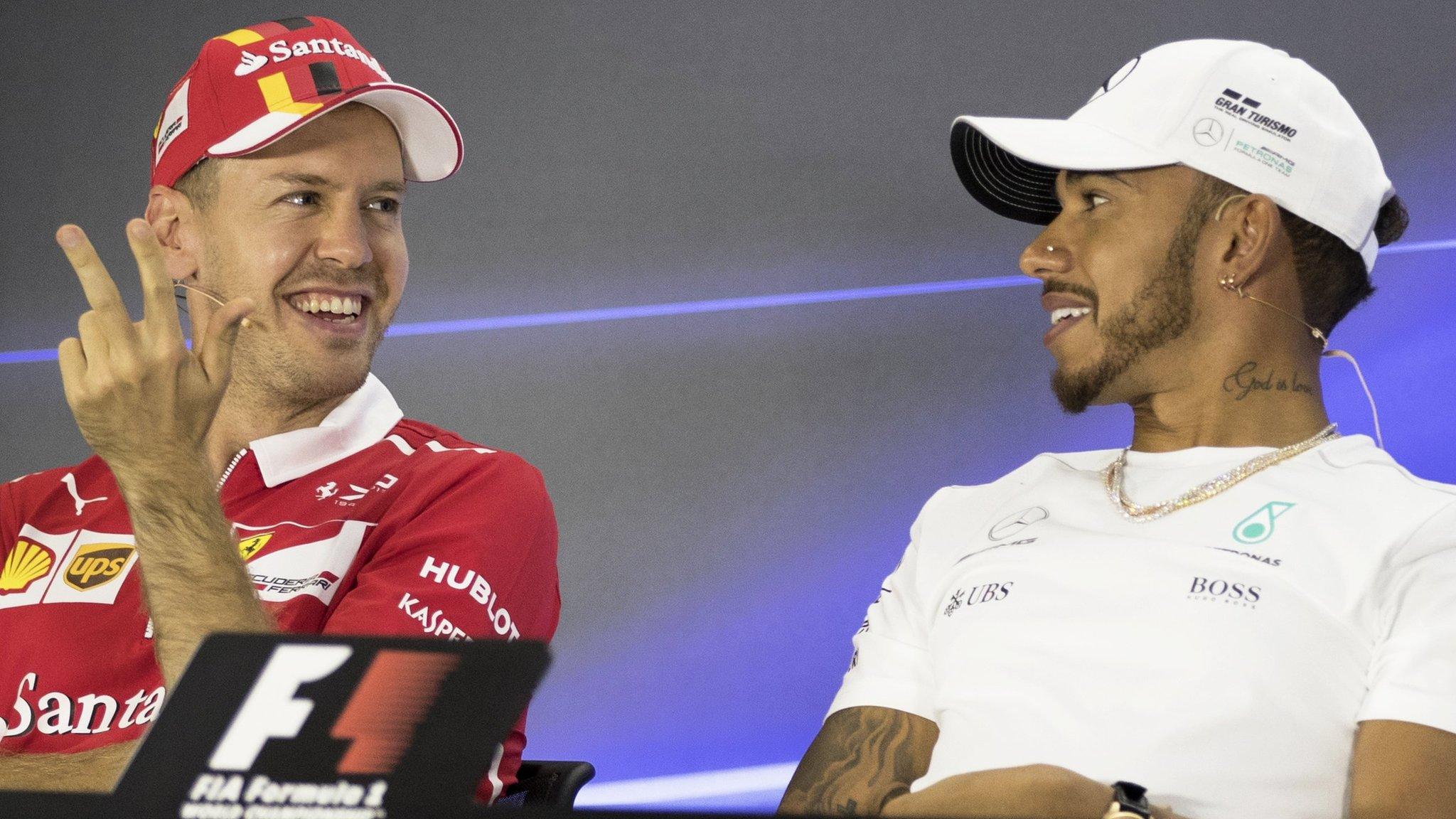Lewis Hamilton on Vettel, Alonso, Verstappen, winning a fourth title & his future
- Published
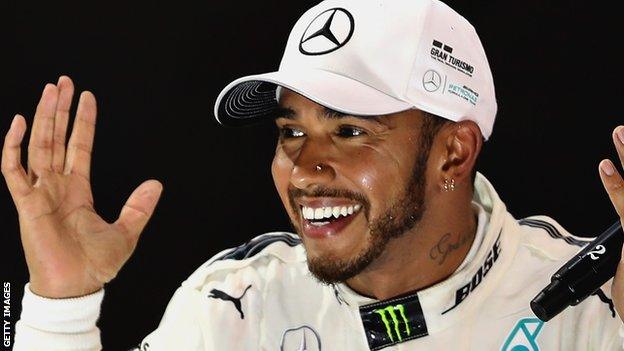
Lewis Hamilton made his Formula 1 debut in 2007 and has now driven in 208 grands prix
Lewis Hamilton is talking about his rivals, and sharing the sort of information Formula 1 drivers usually like to keep to themselves.
"We're the four strongest drivers," he says, referring to himself, McLaren's Fernando Alonso, Red Bull's Max Verstappen and his erstwhile title rival Sebastian Vettel of Ferrari. "I really hope we are all in the fight next year. It would be amazing."
In the year in which he became a four-time world champion, and unquestionably Britain's most successful grand prix driver, Hamilton has had battles with all of them, mostly robust but sportsmanlike. And occasionally, in Vettel's case, not. How does he approach a contest with them?
"You look at them all slightly differently," he says. "They all have different characteristics. Sebastian, for example, from this year, you could say: 'Give more space.' Not in a negative way.
"Max - takes a lot of risks. Also you have to give more space but he is more inexperienced than the other guys.
"Fernando - toughest driver there is, so you have to keep that utmost respect for each other but you've really got to play your cards right."
Does he feel he can race physically closer with Alonso than with the others?
"It seems so," Hamilton says, thinking back to their side-by-side scrap through five corners in Mexico last month, where he clinched the title. "He was very hard and tough but fair. Friggin' heck - his race-craft is mighty.
"But Max's race-craft is very impressive. He's doing wonderful things but he is going to grow so much over the next 10 years. I don't think it will be a problem, it'll just be freaking tough.
"Wouldn't that be a fight? Even I'd pay to see that."
Can we ever really compare the F1 greats?
The battle with Vettel - applying pressure & 'red-mist moments'
As Hamilton talks in this in-depth, end-of-season interview, he is in expansive form. His inherent self-confidence is transparent, but he is also relaxed and revealing in a way that is not always the case.
In F1, his year has been all about his fight against Vettel. For 13 races over seven months it was agonisingly, thrillingly close, and then suddenly it wasn't, and Hamilton won a title that had looked like it would go to the wire with two races still to go.
The season turned in September in Singapore, where Vettel triggered a multi-car pile-up at the first corner that took out himself, his team-mate Kimi Raikkonen, Verstappen and Alonso, and Hamilton guided his Mercedes through the debris to open a 28-point championship lead.
Singapore was a second costly misjudgement by Vettel, following the bizarre incident in Azerbaijan when the German deliberately drove into Hamilton's car, thinking the Briton had 'brake-tested' him. As things turned out, it transformed a certain win for Vettel into fourth place.
Each incident came the race after one which Hamilton dominated from pole position - in Canada before Baku, and in Italy before Singapore. And the obvious question is whether he believes they were caused by the pressure his performances exerted on Vettel.
So, let's ask. Vettel has had two 'red-mist moments'…
"It's kind of been three," Hamilton interrupts. "But OK."
He is referring to Mexico, when Vettel's front wing tagged Hamilton's rear tyre as the two of them tussled with Verstappen on the first lap, giving the Mercedes a puncture. Hamilton asked his team at the time whether it was deliberate, and clearly still believes so.
OK, so let's say three, then. The point remains - was it pressure?
"I don't know," he says. "That's difficult. Anything I say would just be an assumption."
Hamilton turns it around to his perspective.
"Pressure points. Weak points. You just keep your foot down, keep the pressure on and when the other shows no sign of weakness… that's definitely difficult.
"Look at Roger Federer and Rafael Nadal. At some point in the game, one will see a slight weakness in the other - even if just half a per cent. That's what they try to capitalise on and which makes the difference and that's really how it has been this year. The key for me is to be the most solid driver here."
Has Hamilton learned more about Vettel as a person and driver this year?
"Of course," he replies. "I'm not going to tell you what I've learned but you can see it and I think you guys have learned about him.
"He shouldn't shy away from that. He will learn from the experiences, as we all do. I have had years like that. He has had years of complete solidity like (mine) this year as well. I imagine next year he's going to be coming back guns blazing.
"But I don't feel there's anything I can't achieve if I put the work in. How I strategise over these next months into next season…. When you watch Usain Bolt out of the start blocks, he's just a little bit slower than the others. So he's just behind and then he creeps back.
"That's really how my season's been. When he backs off at the end; that's always the goal for anyone."
Nico Rosberg: How to beat Lewis Hamilton to the title
'Landing blows like Anthony Joshua'
There is no arrogance in Hamilton's comparison of himself with such sporting giants in other fields. He is not an arrogant man. It's just a matter-of-fact reflection of his standing in his own sport, enhanced this year by arguably his most complete year-long performance.
Hamilton's was a season of two halves. Tied on four wins each with Vettel at the summer break, he moved into another dimension afterwards, and - perhaps not coincidentally - the wheels began to come off at Ferrari.
Two key events defined his season. The first was a long talk with Mercedes team boss Toto Wolff in the Austrian's kitchen in Oxford, to clear the air after 2016's championship fight with former team-mate Nico Rosberg ended in bitterness and recriminations.
Hamilton has talked about that at length already but now adds a little more depth.
"If you are at the office and your boss doesn't want you there, it's going to be a bad environment, isn't it?" he says. "You want to work there but you don't. That's just negativity drawing away from what you're great at.
"That meeting was really important to re-set things. If there's any negativity or question, it can only hold us back.
"So it was almost a purification of the relationship, and a re-start of the solid foundation we had already built years ago."
The second key event was the Hungarian Grand Prix, where Hamilton asked to overtake team-mate Valtteri Bottas so he could try to attack the leading Ferraris, saying he would hand third place back to the Finn if he could not pass them.
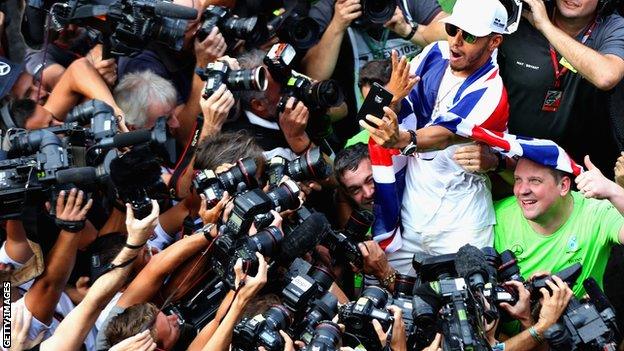
Hamilton is currently the equal third most decorated F1 driver of all time, with four titles - alongside Alain Prost and Sebastian Vettel
By the time it came to switch back, it was an agonising choice all round, because Hamilton had built a big lead over Bottas, and was surrendering three points to Vettel.
Wolff contemplated letting him keep the place, but left it up to Hamilton. He debated it, but did it anyway, the desire to keep his word over-riding that to keep the points.
The consequences of that decision went deeper than he realised they would at the time. It created a mutual trust within the team that was rarely there when Rosberg was his team-mate, and which enabled Hamilton to move on to another level.
After that, he won five of the next six races, finished second in the other, and was imperious even when Mercedes were struggling.
"We'd just won Silverstone," Hamilton says. "That was really turning the wick up. It was like you've been sailing without wind then suddenly you pick up the gust - the right blow, like when Anthony Joshua gets the right punch and the guy's on the back foot after that.
"We were not quick enough in Hungary but I don't feel like it unnerved us at all. It was a special weekend because of the difficulties we went through, plus the scenario really solidified the dynamics in the team and sent such a positive ripple effect.
"It was like: 'OK, this is what we are here to do. This is how we're going to operate. These are our core values.' It was a huge win in terms of our unity.
"It really just added a good amount to the foundation of the relationship with the team, with the engineers as well. We just worked better from then on.
"I did some studying during the summer, to analyse where I had been with the car and was just basically jotting down: 'This is what the car wants, this is how I've gotta drive it.' And then I just did that consistently throughout the season."
'I drive just like I did when I was eight years old in the go-kart'
Hamilton had his shaky moments in the first half of the season. At races on specific types of tracks where Mercedes as a team were struggling, their lead driver's performance was not up to his own high standards, particularly in qualifying. Russia and Monaco were the most extreme examples, but Austria and Hungary also fell into that category.
These, it seemed, came from over-reaching, not wanting to accept that the car would not do more. Hamilton now admits that was indeed the case.
"You wanna squeeze out those extra drops that no-one else can get," he says. "That's where I feel my value is. Often to get that extra potential you have to over-drive a little bit. But it's a fine balance.
"This year people have talked about us having the best car and for sure it's been good but there are some fundamental issues with the car that pop up in those kinds of races that I'm fighting to overcome.
"Understanding the car has really allowed me to get the potential and a little bit more. So even in the races where we've struggled we've come out with more than we'd hoped."
He adds: "I really feel like I drive today just like I did when I was eight years old in the go-kart. That's something I love and that's why I've enjoyed it this year. As a driver it's not just about being quick on the track. It's about consistency, all the other bits of your life, the pieces of the puzzle being in the right place. It's difficult to explain."
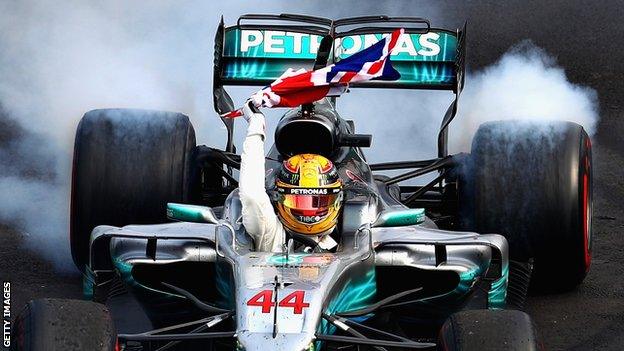
Four titles now also makes Hamilton the most successful British driver of all time
Finding a personal sweet spot - 'racing doesn't run my day'
Hamilton talks a lot about "balance", by which he means finding the right mix of F1 with the other parts of his life to keep his energy, motivation and spirit high throughout the intense demands of a 20-race season.
Given the amount of travel involved just in doing all the grands prix, some have questioned his willingness to hop on his private jet and disappear off to another far-flung part of the world in between races. But for him it is all part of the same picture.
"There's never a moment of, 'how much I can get away with?'" he says. "It's 'how much can I give?' We only have a certain amount of energy in our daily lives and it's how much energy you preserve for those things. It's just finding that balance, shifting that energy.
"Since I've been travelling between races there have been so many things being questioned and now people don't say anything, and that's through finding that right balance. But I have a lot of energy - it's about how you use it and rest and eat."
The same applies to giving himself time away from F1 to reset mentally.
"It's in my everyday thought process but I don't obsess, that's for sure," he says. "I don't obsess about anything. If I obsess about anything it will be time - with family. How can I do this? And do that? Have your cake and eat it.
"On the racing side of things, the more I practise things, the worse it gets. If you do overtime, it can actually be worse. It's about finding the balance.
"I switch off every day. Racing comes into my mind each day but doesn't run my day. Keeping yourself busy is the key for me. People say, isn't it better to relax? No, I like being busy, having my brain firing on all cylinders every day.
And when he does relax?
"I think movies, when you get a moment to settle down. I feel like I'm in the movie when I watch it, in the character. And music."
Life away from F1
Hamilton is a restless soul, always looking for new things to do, different ways to approach his life and career. He craves spontaneity. One example this year has been his unconventional decision to do the season without a personal trainer.
"I just wanted to go back to my roots. Up until F1 I didn't have a trainer and did all my training on my own," he says.
"I remember days where I'd get up, as there was also an expectation at home. I kind of felt, my dad's working at 6am every bloody morning. So I was like, 'I've got to get to the gym, I've got to get to the gym, my dad's working, I've got to be working just as hard as him, because he's working towards the goal of getting to F1.'
"And I remember one day I went to the gym, pulled up and passed out in the car." He laughs. "I was gone, like, the whole day and dad's like: 'You been working out the whole day?' And I'm like: 'Well, no, I slept a little bit then worked out.'
"It was about trying to get back to finding that within myself, because when you have a trainer they're whispering, hanging around, they nag you, push you, which is all good but you can get complacent and lazy because you rely on something and I wanted to get away from that. I've got to figure the dynamic for next year but I like that."
How much longer will he be around?
Outside F1, Hamilton's interests in music and fashion are well known, and he talks about having "a lot of plans, a lot of things that you'll see come together over the next couple of years. Some of them take massive planning. I'm really creating business opportunities outside."
Recently he has spoken about wanting to make an impact in other fields once he leaves F1.
What does he mean?
"Not politically," he says. "But definitely culturally. I think I am a big part of the culture I bring to F1; where I'm from. (It's about) appreciating that more in other locations. Admiring that.

"The charity stuff I've done before, but I'm really starting to focus on the future as my time comes to an end in F1, putting things in place for that part of my future."
Now 32, he has been giving mixed messages all year about how long he will stay in F1 - hinting in the summer it might not be much longer, then saying he wants to do another contract with Mercedes for beyond 2018, now here again talking about his time running out.
"I've currently got another year with the team and I do want to continue (after that), but I'm at that point where there's that question," he says.
"You can't come back to F1. Whatever happens, you are gonna miss it. If it's next year, if it's five years from now, you're gonna miss it when you finish.
"There's a saying you stay as long as you can. I'm not quite sure about that exactly but there is a lot of life left beyond it. Things that I've missed in life.
"I was talking to my best friend the other day about things that I do envy or look forward to, like living in one place, getting a routine: 'That's my gym, I have game night with my friends here.' My family. Each year I stay in the sport, I delay those things.
"But from 40 onwards there's so much time for it. But… my auntie died from cancer and on her last day she said: 'I've worked every day with the plan of stopping one day and doing all these different things. Then I ran out of time.'
"So I'm battling with that in my mind. I do live my life day by day and try to live it to the maximum. That's what I'm fighting with - I want to keep racing but there are these other things I want to do. I want my cake and I want to eat it. I just want to make sure I choose the right time, but I think I will."
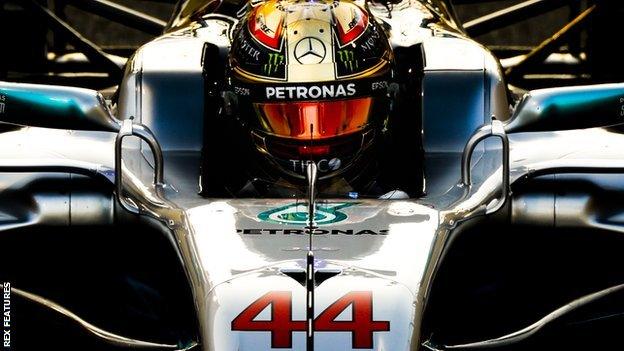
- Published26 November 2017
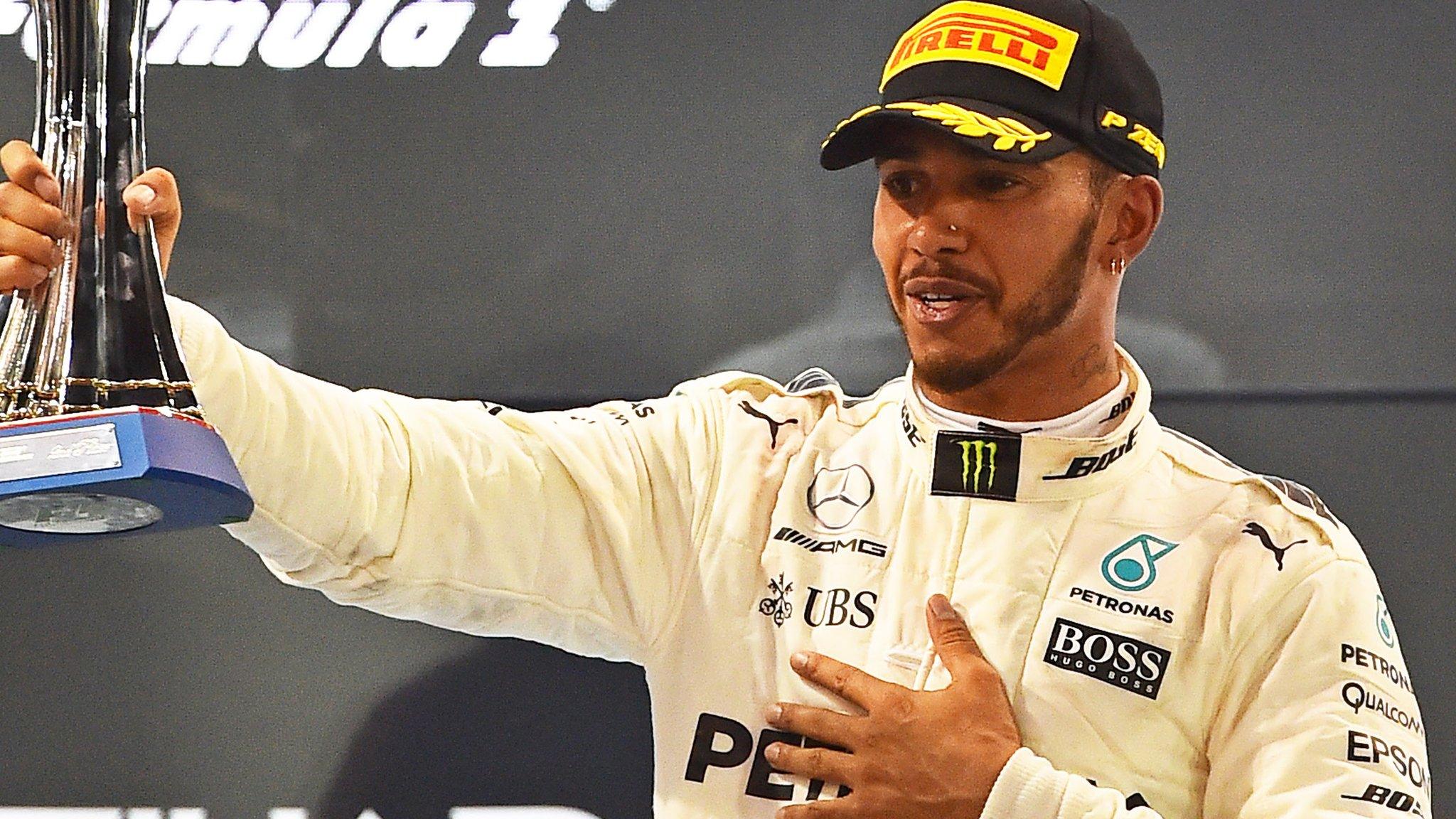
- Published26 November 2017
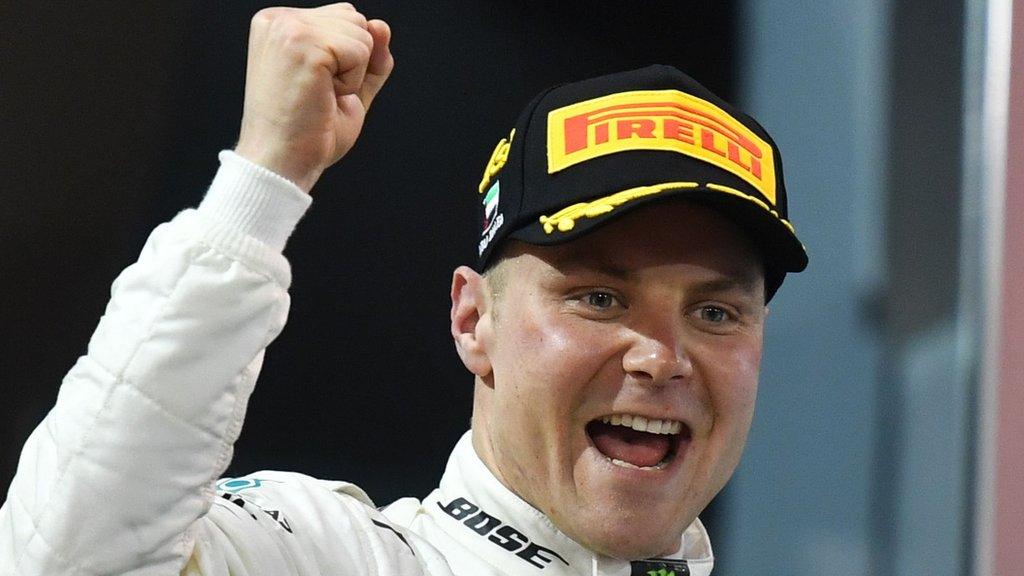
- Published25 November 2017
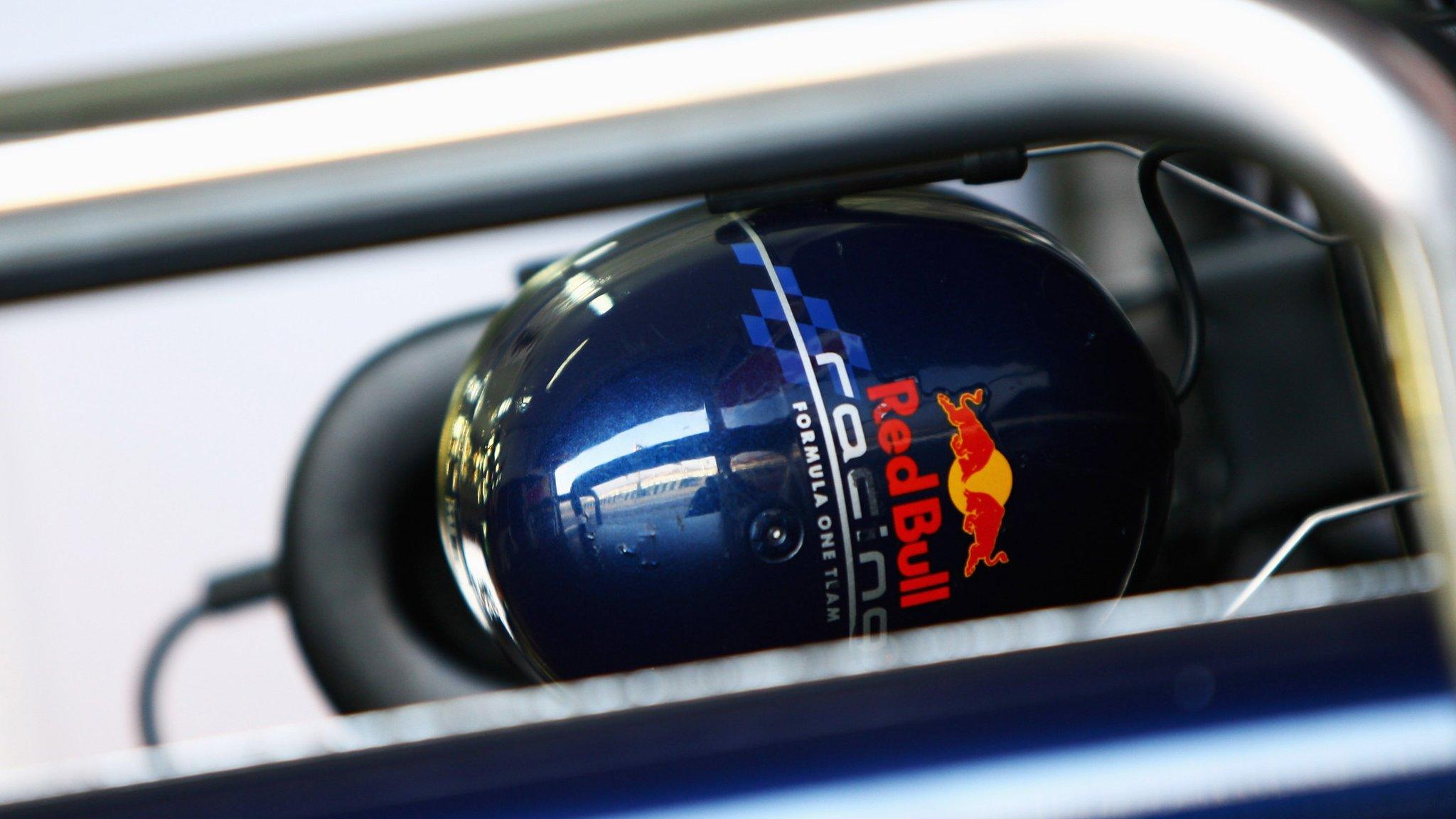
- Published24 November 2017
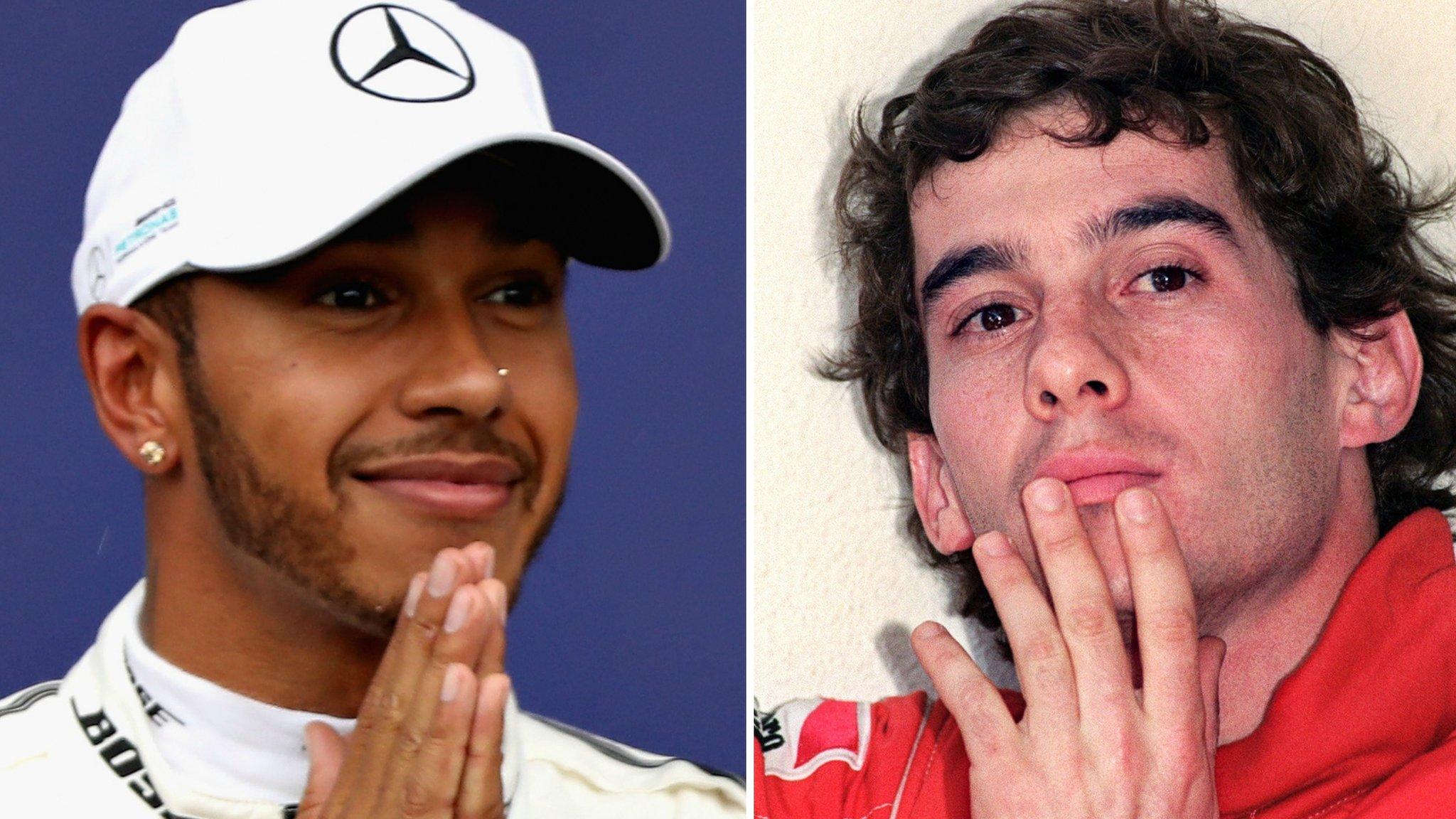
- Published24 November 2017
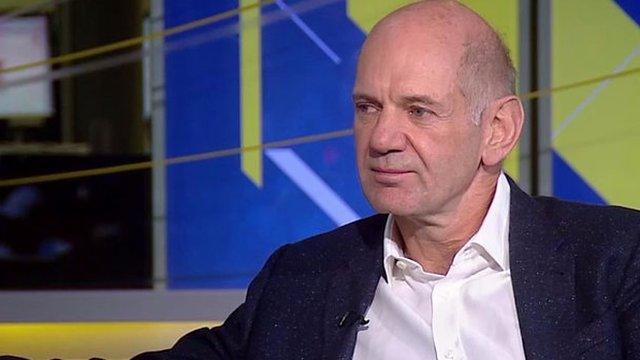
- Published23 November 2017
